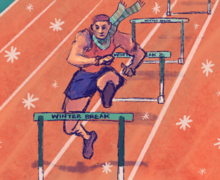Roundtable: State of Syracuse men’s basketball heading into ACC play
Max Frued | Staff Photographer
Elijah Hughes leads Syracuse in average minutes (37.5), points (19.7) and assists (4.7).
The first half of Syracuse’s season has left much to be desired. Though SU handled lesser-talented out-of-conference opponents like Oakland, North Florida and Bucknell, the Orange stumbled through the BIG10/ACC Challenge and NIT Season Tipoff games in the Barclays Center. Still, the Orange were a blown whistle away from sending Notre Dame to overtime and possibly winning their fourth-straight game.
As conference play heats up, SU (8-6, 1-2 Atlantic Coast) has sunk toward the bottom of a struggling ACC.
Here’s what our beat reporters think about three major storylines thus far:
With the conference in somewhat of a down year, how many ACC teams will make the NCAA Tournament and how many conference wins would SU need to be one of them?
Nick Alvarez: I’d definitely consider this a down year for the ACC. ESPN bracketologist Joe Lunardi has just five teams slated for the big dance, the fourth-most from any conference. I think that number rises a bit, let’s say seven, due to conference play artificially boosting lower-tier teams — like Georgia Tech, who just beat North Carolina at Chapel Hill. I’d also keep an eye on Notre Dame, and that’s only partial recency-bias after they outlasted Syracuse in the Carrier Dome last weekend. The combination of T.J. Gibbs’ shooting and John Mooney’s interior dominance (he leads the nation with four 16-point, 16-rebound games) sold me on the Irish’s ability to beat up on lower-tier ACC teams, get to 20 wins and secure a tournament berth. Where does that leave Syracuse? Well, the Orange are a perennial bubble team and conference play usually gives them the opportunity for marquee wins. But with the ACC struggling, the Barclays Center losses loom large. Even if they pull off home upsets against Duke and North Carolina, I can see the overall resume costing the Orange, like it did in the 2016-17 season when 19 wins left them hosting the NIT.
Michael McCleary: I’d say six. Maybe seven. For Syracuse’s sake, they’d definitely hope for the latter. As far as the NET rankings go, the Orange aren’t too far out of it. At least they’re not done for already. SU currently ranks 88th in the NET rankings, which is the ninth-ranked team in the ACC. But the distance from nine to seven is only nine slots, and the team the Orange would need to catch is Notre Dame. Syracuse just lost a close one to the Irish, and while it does no actual good for their resume, if the Orange gather some resume-boosting wins in the second half I could easily see the committee giving SU the edge. Here’s the problem for Syracuse: To earn that edge, they would need among their best conference years in recent memory and they need the ACC to improve too. Nick made a good point above that the conference will probably get the boost that it always does because ACC wins are continually given a lot of weight. But if Notre Dame, Georgia Tech and Virginia Tech don’t win big conference games, Syracuse’s wins over against them could be insignificant. Sure, the Orange can get into the tournament by beating Duke, Louisville, Virginia, Virginia Tech and NC State, but what’s the likelihood of that? The more likely scenario is SU pulls off some good wins against ACC teams that have increased their own credibility by way of their own quality wins. If that’s the case though, Syracuse’s early season struggles may still cause the Orange to find themselves behind the very teams they beat.
Josh Schafer: The NET rankings currently have six ACC teams in the top 68 right now and it’s hard to see that changing too much. As Michael said, there’s a chance that a seventh ACC team slides in but with the conference having a weak nonconference showing, the lower teams beating each other up won’t help resumes that much.
The ACC record for teams in the tournament is nine, which was set in 2018 and Syracuse qualified with eight wins. Last year, the conference had seven teams in the tournament and Syracuse qualified with 10 conference wins. Since the logic indicates when the conference is down, Syracuse needs more wins, the Orange probably needs somewhere around nine more conference wins in its final 17 ACC matchups.
The real deal breaker for Syracuse won’t necessarily be how many wins but against which teams. Syracuse hosts North Carolina this year and that game is quickly slipping as a marquee matchup. But the Orange do host Duke and travel to Louisville. With an average (at best) nonconference performance, Syracuse will either need an eye-popping win against one of the powerhouses or must consistently beat up on other mid-tier ACC teams to qualify for the tournament. From what we’ve seen thus far, it’s hard to predict the latter.
Against Notre Dame, SU played seven players, with Elijah Hughes, Marek Dolezaj and Buddy Boeheim playing all 40 minutes. Out of Syracuse’s role players, who do you expect to have the biggest impact in ACC play and down the stretch?
N.A.: Marek Dolezaj. Syracuse’s do-everything forward offers something more than the shooting prowess displayed by the triumvirate of Hughes, Buddy Boeheim and Joe Girard III: Interior playmaking. He’s shown the ability to go coast-to-coast, providing a potential boost to SU’s transition woes if he can start passing on the break, and he’s been more willing lately to heave mid-range jumpers while defenses focus on the 3-point line. SU is a shooting team. We know that. The problem is that every other ACC team is aware of that, too. For the Orange to make a strong ACC run and piece together an NCAA Tournament resume, they’ll have to offer something different. Dolezaj’s dynamism could be the answer. And on the defensive end, while Bourama Sidibe continues to struggle, Dolezaj will repeatedly be thrust into the center role in the 2-3 zone. We’ve talked about it endlessly, but Syracuse’s interior defense is its weakness and it will look to Dolezaj to handle the likes of Louisville’s Steven Enoch and Duke’s Vernon Carey Jr.
M.M.: I’d say Bourama Sidibe. If we use the Notre Dame loss as an example, even without Elijah Hughes scoring at all, Syracuse stayed in the game early in the first half because Sidibe dominated on the offensive glass. Sidibe has the ability to do that, as he showed Saturday. But he was also wildly ineffective in the second half. Jim Boeheim said teams beating the Orange on the inside is a constant struggle for SU, and that might be an understatement. Sidibe is certainly a major culprit. But, he’s also the only Syracuse player with a large enough frame to make an impact down low. Jesse Edwards is too raw at this point, Marek Dolezaj is not strong enough and Quincy Guerrier probably fits better at the power forward spot. If Sidibe can get going — that means improving his defense, remaining consistent rebounding the ball and adding an element of offense off put-backs, dump-offs and lobs — he can turn a middling Syracuse team into a real threat.
J.S.: If the last five minutes against Notre Dame are any indication, Joe Girard III could be the player that helps this Syracuse team win some tough games. The point guard position has been a question for Syracuse since the season started, and Girard has slowly solidified his role up top.
Though he turned the ball over four times against Notre Dame, his 10-point run late in the second half nearly won the game for the Orange – Girard finished with 20 points. Girard flipped a switch similar to what many saw him do in high school and it appeared like he couldn’t miss for those few minutes against the Fighting Irish.
The best part of that performance is Syracuse didn’t need Girard to do it for 40 minutes. Elijah Hughes is the scorer for this Orange team, but if Girard can catch fire in short spurts, he can be the third scoring option Syracuse desperately needs. How consistently Girard can help spark runs and hit 3-point shots could decide whether this Syracuse team finds a way to make a run in conference play.
Does Elijah Hughes deserve to be considered for ACC Player of the Year?
N.A.: Considered? Yes. Win? Not at all, barring a historic Syracuse conference run. Hughes is far and away the best player on this team and there may be only a handful of defenders in the ACC that can stop him one-on-one. Yet, I fall into the category of thinking that team performance matters in awards like these. Carey might be one of the final stalwarts of the one-and-done era and Louisville’s Jordan Nwora is an all-around talent who, in my opinion, will carry Louisville to an ACC tournament title. Hughes will continue to stuff the stat sheet, and probably post the triple-double he nearly got against Niagara, but playing in low-stakes contests hurts his case. It should do wonders for his draft stock, however.
M.M.: Absolutely. I actually think he can win it, too. I agree with Nick’s point that team performance has to factor in a little, but Hughes is for real. Hughes ranks in or near the top-five in nearly every statistical category in the ACC and can go on absolute scoring explosions at any given moment. It will probably take a signature moment, but from watching Hughes the entire year, he’s been the best player on the court in every game he’s played — including against Virginia, Georgetown and Notre Dame. His biggest competitors at this point are probably Carey, Tre Jones, Cole Anthony and Nwora. Despite a down year in the conference overall, there’s no shortage of individual talent. Anthony’s case will struggle (despite being the best overall player, probably) because of missed time due to injury. Among the rest, none of them have an individual skill as good as Hughes’ shooting. The fact he’s not on every NBA Draft Big Board by now is absolutely mind-boggling. A player like Hughes could, and probably should, get drafted in the first round. Eventually, that talent will shine through in the biggest games SU will play this season. That alone could be enough to keep him in the conversation.
J.S.: Syracuse has never had an ACC Player of the Year, but that doesn’t mean Hughes can’t be the first.
Part of the reason this question is hard to answer is because it’s unclear what matters most when these things are voted on. Recent history (the last five players were from Duke, North Carolina or Virginia) indicates that the player needs to be on a good team. But the counter argument to that would be if Hughes proves himself to be the best player on the court in losing efforts to the conference’s top teams, he’ll be hard to ignore.
The lack of support around Hughes will attract a lot of defensive pressure. If he still scores and creates opportunities for others while being the center of defensive attention, there’s no way he’s not in consideration.
Published on January 6, 2020 at 9:58 pm





